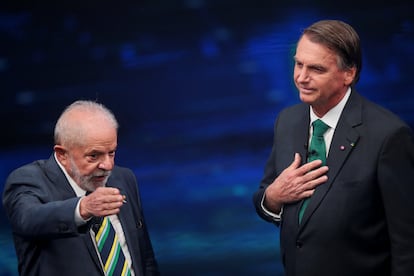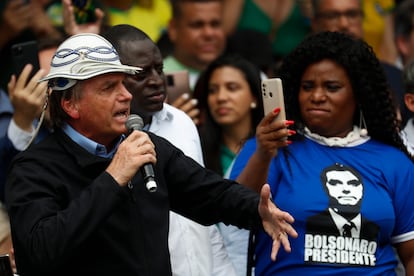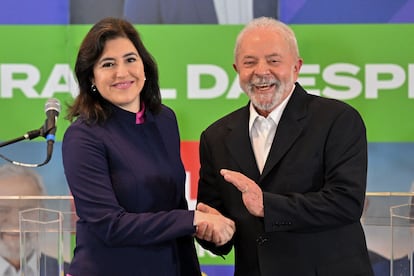Brazil presidential election enters final, dirty phase
As Lula and Bolsonaro go after handfuls of undecided or apathetic voters before the runoff election on October 30, the opposing campaigns are launching vicious attacks at each other


On October 2, Luiz Inácio Lula da Silva – popularly known as “Lula” – missed an outright victory in the first round of Brazil’s presidential election by only 1.86 million votes. Two weeks from now, on October 30, the former president – who governed from 2003 until 2011 – will have to face incumbent President Jair Bolsonaro in a runoff election to determine who will lead one of the world’s largest democracies.
The first round saw Lula, of the left-wing Workers’ Party, secure 48.4% of the vote, with the right-wing Bolsonaro close behind at 43.2%. The centrist candidates brought up the rear, with Senator Simone Tebet and career politician Ciro Gomes getting 4% and 3% respectively. About 20% of Brazilians abstained, with a few extra million people casting blank or ruined ballots.
As Lula and Bolsonaro race to the finish line, the attacks being hurled in an already-bitter electoral battle have gotten even dirtier. Lula’s campaign has accused Bolsonaro (albeit unseriously) of cannibalism, bestiality and Freemasonry. A judge even stepped in to ban some of these provocative ads. Meanwhile, Bolsonaro’s team has insisted on comparing Lula to the devil, while making allegations that the former president is affiliated with the PCC – the First Command of the Capital – the largest criminal gang in the country.
According to the polling institute Datafolha, 93% of Brazilians have already chosen a candidate for the second round. This leaves only a few citizens undecided – especially as it is unlikely that those who voted blank or spoiled their ballots in the first round will suddenly opt to choose a candidate in the runoff.
Sociologist Esther Solano has studied Brazil’s voters via focus groups. She spoke to EL PAÍS over the phone about who is going to decide this explosive election:
“There are three [decisive] groups: the voters of Simone [Tebet] and Ciro [Gomes] – especially hers, as she has positioned herself as the main representative of the center – the evangelical Christians and, of course, those who abstained in the first round.”

Eager to peel religious voters away from Bolsonaro, Lula has even released a “letter to the Christians,” which conveniently omits his positions on abortion or drug legalization. It limits itself to emphasizing that the Brazilian constitution guarantees freedom of religion, in an attempt to gain a foothold in a demographic that overwhelmingly rejects the Workers’ Party. This has been done very carefully, in an effort to avoid upsetting his secular base.
Both Tebet and Gomes have endorsed Lula, asking their voters to support the former president to safeguard democracy. Senator Tebet, a woman and a fresh face, aligned with Lula only after securing policy commitments on housing, education and the environment.
If those who voted for Tebet and Gomes cast their ballots for Lula, he will likely secure a third term in power. But this is not guaranteed.
“Some centrist voters who despise the Workers’ Party may abstain,” says political consultant Pablo Gentili, a Lula supporter. While polls show that half of Brazilians won’t vote for Bolsonaro under any circumstances, Lula clocks similarly unfavorable numbers, with 46% of Brazilians rejecting him completely. The former labor leader needs to convince them that the survival of Brazilian democracy is at stake if he loses – or, at the very least, he needs some of the people who despise him to not show up for Bolsonaro.

One of the few undecided voters is Marcos Oliveira, 47, who makes a living behind the wheel of an Uber in the heavy traffic of São Paulo. He doubts the polls that the Brazilian press, businessmen and politicians avidly consume.
Four years ago, Oliveira bet on Bolsonaro’s promise of change. He has since been disappointed, just as he was with the Workers’ Party. In the first round, he voted for Ciro Gomes, a former governor and minister: “He [was] the only one who presented a program to govern.” Now, to make his decision, Oliveira will rely on the final televised debate between Bolsonaro and Lula, set to be held just two days before Brazilians head to the polls.
By phone, he told EL PAÍS that, as of now, his preference is Lula, “but if he doesn’t convince me, I will vote blank.” When asked why he leans towards Lula, he replies, “because the best time for my [social] class – the poor – was during his government. But I’m not stupid, eh? The Workers’ Party stole a lot, just like the others.” Only if Lula offers a decent platform will he give him his vote.
Edjane Gama, a 45-year-old small businesswoman, voted for Tebet and is now for Lula. “As a Christian, I think I can give him another chance… I hope he has matured,” she says.

Bolsonaro knows that the odds are against him. That’s why – in addition to evoking the battle between good and evil, God and the devil – he is also relying on earthly political tactics. He has opened up the tap of public money for the neediest Brazilians, while continuing to link Lula to crime and corruption. And he is not an ineffective campaigner: on October 2, many critics of President Bolsonaro were stunned by the power of the movement he leads, as indicated by his allies achieving a majority in Congress.
Gentili notes that while Bolsonaro’s victory in 2018 “seemed like a passing expression of rage, of discomfort with democracy, it has become an established movement in a very forceful way.”
To defeat a president who has been accused of eroding Brazil’s democratic institutions, Lula has opted for safe, simple rhetoric in the runoff campaign, designed to unite voters around democracy rather than a particular ideological tendency. He has left the rough play to his media consultants, who have put out shocking videos on social media to imitate Bolsonaro’s bombastic, “fake news” ads. Now, both teams are spreading lies via short videos and posts that are mostly shared over WhatsApp.
The leader of this strategy is congressman André Janones, a Lula ally who has two million followers on Instagram and was recently re-elected to his seat. While he calls himself a “lover of Jesus,” turning the other cheek really isn’t his style.
Tu suscripción se está usando en otro dispositivo
¿Quieres añadir otro usuario a tu suscripción?
Si continúas leyendo en este dispositivo, no se podrá leer en el otro.
FlechaTu suscripción se está usando en otro dispositivo y solo puedes acceder a EL PAÍS desde un dispositivo a la vez.
Si quieres compartir tu cuenta, cambia tu suscripción a la modalidad Premium, así podrás añadir otro usuario. Cada uno accederá con su propia cuenta de email, lo que os permitirá personalizar vuestra experiencia en EL PAÍS.
¿Tienes una suscripción de empresa? Accede aquí para contratar más cuentas.
En el caso de no saber quién está usando tu cuenta, te recomendamos cambiar tu contraseña aquí.
Si decides continuar compartiendo tu cuenta, este mensaje se mostrará en tu dispositivo y en el de la otra persona que está usando tu cuenta de forma indefinida, afectando a tu experiencia de lectura. Puedes consultar aquí los términos y condiciones de la suscripción digital.








































